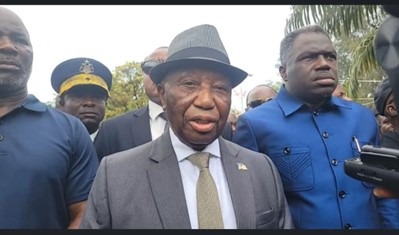The political landscape in Liberia is currently embroiled in a complex power struggle within the House of Representatives, raising concerns about the rule of law and the separation of powers. At the heart of the controversy lies the contested Speakership and a Supreme Court ruling that has seemingly been disregarded by the executive branch. President Joseph Boakai, while acknowledging the Supreme Court’s decision upholding Speaker J. Fonati Koffa’s position, has indicated his preference for a political solution to the impasse. This stance directly contradicts the court’s ruling and suggests a concerning disregard for the judiciary’s authority.
The Supreme Court’s ruling affirmed Speaker Koffa’s legitimacy and implicitly rejected Representative Richard Koon’s claim to the Speakership. Despite this clear legal determination, President Boakai’s administration appears to be maneuvering to install Representative Koon as Speaker, a course of action that undermines the rule of law and the principle of respecting judicial decisions. This political maneuvering raises questions about the executive branch’s commitment to upholding the constitution and the independence of the judiciary.
The President’s justification for seeking a political solution rests on the premise of “broad consultations” with various stakeholders, including traditional leaders. While dialogue and consensus-building are essential elements of a functioning democracy, they should not supersede the established legal processes and the decisions of the highest court. By prioritizing political negotiation over the implementation of the Supreme Court’s ruling, the executive branch sets a dangerous precedent, potentially signaling that political expediency trumps legal principles.
This situation is further complicated by Representative Koon’s own actions. While he acknowledges in his petition to the Supreme Court that he is not the Speaker, he simultaneously seeks a re-argument of the case, creating a paradoxical situation. This ambiguity fuels speculation about his motivations and the influence of the executive branch on his actions. The President’s insistence on a political resolution, coupled with Representative Koon’s legal maneuvering, raises concerns about a potential orchestrated effort to circumvent the Supreme Court’s ruling.
The President’s stated commitment to upholding the law and ensuring national harmony contrasts sharply with his administration’s actions in this specific case. By disregarding the Supreme Court’s ruling, the executive branch undermines the very principles of law and order it claims to champion. This contradiction creates a climate of uncertainty and potentially emboldens those who might seek to challenge legal authorities.
The implications of this power struggle extend beyond the immediate issue of the Speakership. The disregard for the Supreme Court’s decision sets a dangerous precedent and raises fundamental questions about the balance of power between the executive and judicial branches. This could erode public trust in the judiciary and the rule of law, potentially destabilizing the country’s democratic framework. The situation underscores the importance of upholding the principles of separation of powers and respecting the decisions of the judiciary to ensure a stable and just society. The President’s actions stand in stark contrast to his pledge to uphold the rule of law and raise concerns about the future of Liberia’s democratic institutions.


